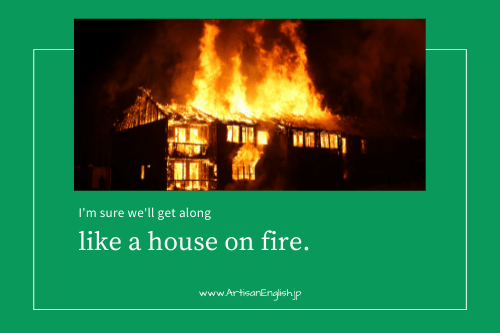
YouTube / iTunes / Spotify / Radio Public / Pocket Casts / Google Podcasts / Breaker / Overcast
Listen to ArtisanEnglish.jp posts & lesson intros here.
Idiom: Like a house on fire
English is a language that drives its learners crazy.
It has so many idioms whose meanings are impossible to figure out logically.
For example, if I told you that my wife’s mother and I get along like a house on fire, what would you think?
Would you think we fight or argue a lot?
You’d be wrong.
To get along like a house on fire means two people have an excellent relationship with each other.
I know, right?
What the heck!
Hey, English is English.
Sometimes you’ll feel much better if you don’t concentrate on the whys and take it as it is.
One of the main reasons older learners have so much trouble with English is they ask why, whereas young learners never do.
I know, as a teacher, you expect me to have all the answers – and I do – well, most of the time, anyways.
Wood burns well.
Dry wood burns even better.
Houses are often made of dried wood.
When they burn, they burn quickly.
Therefore, when people get along well, the friendship burns hot and quickly, like a house on fire.
Yes, a house burning down is a terrible thing, but don’t look at it that way.
It’s an idiom.
You may think that idiots create idioms, but I assure you, I am not the idiot who made this idiom.
Please don’t shoot the messenger.
Put a smile on your face and accept the language for what it is.
Do that, and you and English will get along like a house on fire.
Flesch-Kincaid Readability Test
This post is understandable by someone with at least a 6th-grade education (age 11).
On the Flesch-Kincaid reading-ease test, this post scores 85.
The easier a passage is to read, the higher the score on a scale of 0 – 100.

